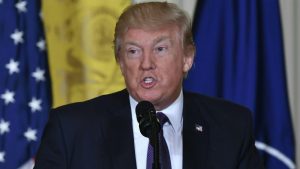 U.S. President Donald Trump visited the state of Wisconsin in his efforts to reassure his supporters that his ‘America First’ agenda was still on course. This followed a couple of policy reversals which got a part of his base worried that Trump had abandoned the nationalistic agenda which helped sweep him to power for a more conventional Republican approach.
U.S. President Donald Trump visited the state of Wisconsin in his efforts to reassure his supporters that his ‘America First’ agenda was still on course. This followed a couple of policy reversals which got a part of his base worried that Trump had abandoned the nationalistic agenda which helped sweep him to power for a more conventional Republican approach.
“We’re going to do everything in our power to make sure more products are stamped with those wonderful words ‘Made in the USA,’? We’re sending a powerful signal to the world. We’re going to protect our workers, defend our jobs and finally put America first,” Trump told workers at Snap-on, a Kenosha, Wisconsin-based tool manufacturing plant.
H-1B visa program
Though the executive order would make no changes to the visa program, how it works is likely to be tweaked in the near future. Some players in the tech sector have for long complained that most of the 85,000 visas that are awarded every year go to outsourcing companies which end up hiring tech workers that are relatively lower-skilled. This ends up preventing companies that would need the visas in order to hire higher-skilled workers from getting them.
Outsourcing firms
With Indian nationals comprising some of the biggest beneficiaries of the H-IB visa program, some of the outsourcing firms that would likely be affected by changes include Infosys Ltd, Cognizant Tech Solutions Corp and Tata Consultancy Services Ltd. These firms link tech companies in the United States with programmers and engineers numbering in the thousands every year.
Since the current system of awarding the H-1B visas is based on a lottery, Trump administration officials have said they would want to change to one based on merit and restrict it to purely highly skilled workers.
Additionally, the executive order that was signed in the state of Wisconsin also seeks to push for the enforcement of rules that bar foreign contractors from placing bids on contracts being awarded by the federal government. The order also seeks to ensure that the melting and pouring of all steel meant for use in federal contracts is done in the U.S.
